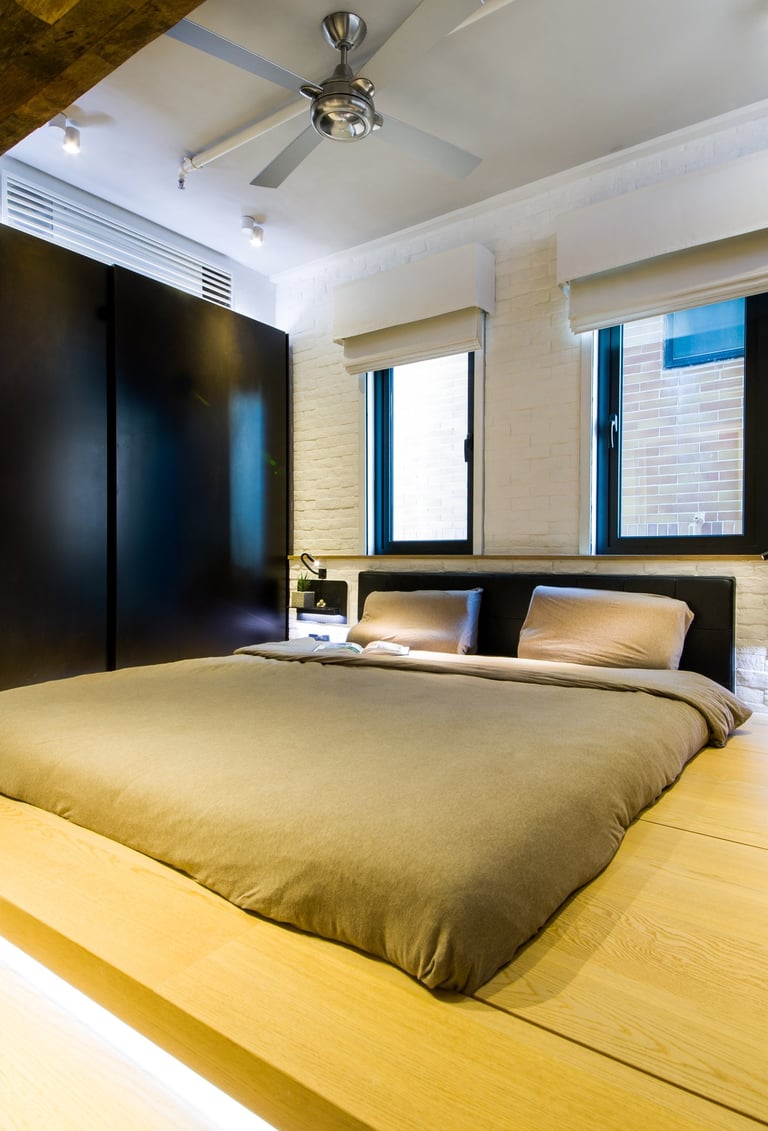Reclaiming Rest: Why Amazing Sleep is the Ultimate Life Upgrade
A practical guide to transforming your nights - and your days.


Source: Vivid Living Eco-Health Flat, Sheung Wan, Hong Kong
I used to think skipping sleep was a badge of honour.
Maybe you did, too. There was this good friend I tried to copy who seemed to function effortlessly on just four hours of sleep and seemed to get so much more done than I did. One of my former colleagues wore his sleep deprivation like a trophy, proudly boasting about red-eye flights from the U.S. to Europe followed by immediate back-to-back meetings. Sleep often seemed negotiable. A flexible resource. A luxury, even.
But here’s what I’ve learned: sleep isn't a reward for good living; it’s the foundation of it. It sharpens our thoughts, elevates our creativity, makes our bodies more resilient and significantly improves the quality of our relationships. It makes us better partners, parents, and friends.
Now, in my fifties, I 've realized that good sleep isn’t negotiable anymore. As we age, our natural melatonin production decreases and our sleep becomes more fragmented, making quality sleep even more critical. I struggled with feeling exhausted in the mornings despite sleeping a full 7 to 7 1/2 hours straight through the night. My sleep tracker confirmed I slept well though I stopped using it because it became more stressful than helpful. What started as a personal quest to feel less groggy became an eye-opening journey into just how critical sleep really is, not just for energy, but for every aspect of our health.
The Science We Can't Ignore
Dr. Matthew Walker, author of Why We Sleep, makes a striking case: routinely sleeping less than seven hours a night damages every major system in the body. Memory, immune function, metabolism, emotional regulation, and cardiovascular health are all affected. As he puts it, sleep is the "Swiss Army knife" of health.
Sleep deprivation, even mild, has effects comparable to being legally drunk. Just 18–24 hours awake impairs reflexes, decision-making, and mood as much as a 0.08% blood alcohol level. Yet many of us live in a chronic state of sleep debt, often unknowingly.
The World Health Organization now considers sleep loss a public health epidemic. It’s linked to diseases we’ve come to fear: Alzheimer’s, heart disease, obesity, and depression, and yet we rarely treat sleep with the same urgency as diet or exercise.
Your Bedroom: Your Health Platform
My old company in Hong Kong, Vivid Living, was dedicated to integrating health into the built environment. We designed homes and offices using healthy and sustainable building materials, not just for form or function, but to nudge people toward better health and wellbeing.
Your bedroom isn't just where you rest, it's a platform that can either support or sabotage your health. While your entire home and office environment matters, your bedroom deserves special attention given how much time you spend there and its impact on your daily recovery and restoration.
Air quality, light exposure, materials, noise, and even clutter have measurable impacts on sleep quality. The wrong building materials, like VOCs in paints, formaldehyde off-gassing from cabinetry can disrupt your rest, as can dust mites in bedding, even if you don’t consciously notice these issues. Simple changes like using natural fiber rugs and bedding, non-toxic paint, and blackout curtains can dramatically improve air quality and circadian alignment.
This isn't just aesthetic. It's functional. It's medical.
Better Sleep: A Checklist for Your Body, Brain, and Bedroom
Sleep doesn’t start when your head hits the pillow. It starts hours before and depends on the environment around you.
Here’s a practical, research-backed checklist:
Build a Sleep-Worthy Routine
Wind down 30–60 minutes before bed with reading, soft music, light stretching, yoga or meditation.
Limit screen use before bed because blue light (even in night mode) suppresses melatonin and delays sleep; avoid stimulating content as well.
Try a warm bath to reduce core body temperature (sauna works for me, but it’s not for everyone)
Maintain consistent bedtime and wake time, even on weekends, to stabilize your circadian rhythm.
If you can’t fall asleep within 30 minutes, leave the bed and do a relaxing activity in dim light to avoid associating the bed with wakefulness.
Track your patterns with a sleep journal or tracker to show what works best for you.
Master Light, Sound, and Temperature
Morning: Get sunlight within 30 minutes of waking to anchor your circadian rhythm. Use a bright light therapy lamp in winter.
Evening: Dim lights 1-2 hours before bed; use warm or red-hued bulbs.
Night: Use blackout curtains or sleep mask; try earplugs or white noise machine.
Temperature: Keep bedroom around ~18°C (65°F) with breathable bedding. If your partner and you have different temperature preferences, consider a temperature-controlled mattress pad. I haven't used one yet (they are pretty pricey) but have friends who swear by it and improved their deep sleep significantly.
Work out in the mornings if you can and avoid vigorous workouts within a few hours of bedtime.
Perfect Your Sleep Environment and Materials
Choose organic cotton or wool bedding and a supportive mattress (latex or hybrid work well).
Select pillows suited to your sleep position (side sleepers' knees shouldn't touch).
Use natural fiber rugs and VOC-free paints (building materials can off-gas chemicals that disrupt sleep).
Ventilate regularly (if outdoor air quality allows) and get a professional-grade HEPA air purifier.
Remove dust-collecting décor and unnecessary electronics, tape over LED lights.
Time Your Caffeine and Alcohol Intake
Caffeine: Avoid 8–10 hours before bedtime; delay first coffee 90 minutes after waking for better energy stability.
Alcohol: Despite popular belief, alcohol is a sedative that fragments sleep, suppresses REM, and raises heart rate. Even one glass impacts recovery measurably.
Food: Eat dinner 4–6 hours before bed since late eating interferes with melatonin and temperature regulation.
Consider Targeted Supplementation
Some doctors are still cautious about sleep supplements unless you have deficiencies, but most acknowledge benefits for older adults or those with specific needs.
Leading longevity experts (Attia, Patrick & Huberman) consistently recommend this research-backed trio:
Magnesium (L-Threonate or Glycinate): promotes relaxation, reduces anxiety.
Glycine: calms nervous system, improves sleep quality (~2g before bed).
L-Theanine: reduces mental stress without drowsiness.
Back to the Beginning
So, what’s changed for me? Everything. Late-night screens became books (especially audiobooks), alcohol disappeared (not completely but mostly), and morning workouts replaced evening sessions. Gone too is my afternoon coffee, and my bedroom got a complete redesign with hardwood flooring, an air purifier, mood lighting, blackout curtains. I invested in a good sleep mask for travelling and wear ear plugs when going to bed, a habit I picked up living in China. It’s not perfect. But the difference? Unmistakable.
Better sleep hasn't just given me more energy. It's made me kinder, more focused, more creative, and somehow, more myself. My heart rate variability improved by over 30%, a clear indicator that my body is recovering and adapting better than it has in years.
Remember that friend I mentioned at the beginning? The one who seemed so productive after four hours of sleep? Looking back now, he wasn't thriving; he was surviving. The real badge of honour isn't how little sleep you can get by on, but how well you can prioritize what truly matters.
And it all started with a simple shift in belief: sleep isn't a waste of time. It's how we reclaim it.
